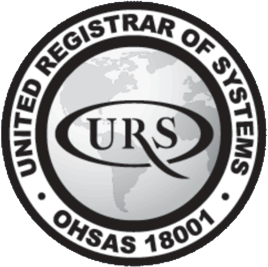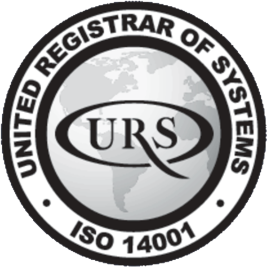
As a company dealing in construction since 2006, ARCOIN, S.L. took the strategic decision within its Company Policy to implement a Comprehensive Management System according to the UNE-EN ISO 9001:2008, UNE-EN ISO 14001:2004 and OHSAS 18001:2007 Standards and in line with EC regulation 1221/2009 (EMAS), as a tool for continuous improvement and future guarantee. The general directives of this Management Policy establish:
- The satisfaction of our clients is our main aim. We therefore carefully select our suppliers of materials and (particularly) services, as our company subcontracts all items of work of the projects we are commissioned. Along these lines, we are compelled to work with the best suppliers in the area.
- The end quality of the service provided to clients is the result of planned, systematic actions of continuous improvement included in the Management System, which enables us to offer a better service than our competitors.
- Preventing pollution and preventing damage and harm to health are key commitments for the continuous improvement of our management system and the undertaking of health and safety in the workplace.
- ARCOIN, S.L. is also committed to ensuring compliance with all legal and regulatory requirements applicable in terms of the environment and health and safety, as well as any other related requirement that we decide to endorse.
To undertake this policy and meet our continuous improvement objectives, the unconditional support of all company personnel is essential through their firm, continued commitment to Quality, the Environment and Prevention.
We are sure that all of these efforts will lead to the improved quality of our work, our environmental management and the safety of all, thus helping ensure a future for ARCOIN, S.L. that respects the environment.
OUR COMMITMENT
In both the construction and the services sector, ARCOIN remains permanently committed to Quality and to Environmental protection, which is structured around the following premises forming the Quality and Environmental POLICY
- Continuous improvement in Quality and the Environment is a priority to be upheld in all work centres. The Management therefore sets the corresponding objectives and goals, allocating the necessary resources for their implementation and monitoring
ARCOIN makes every effort to prevent pollution and to minimise the environmental impact generated by the different activities, as described in ENVIRONMENTAL ACTION that also forms an integral part of this POLICY
Customer satisfaction is a basic premise in Group activities, with the commitment to meet the requirements specified in contracts
Relevant present and future legal and regulatory requisites of an environmental nature and those related to Quality and defined by contract are strictly met, along with other requirements subscribed to by the organisation
ARCOIN employees perform their work in a manner that is compatible with this policy and with the general objectives of the Group. The Management promotes training and informative activities that provide suitable sensitisation, ensuring employees are aware of this POLICY and take part in its compliance
The Management performs reviews to ensure the POLICY and the objectives are fulfilled, actively improving environmental action in all activities and Customer satisfaction
This POLICY is available to customers and to the general public. Requests for information by interested external parties are dealt with and, where necessary, information is offered relating to the impact of the activities on the environment

OHSAS 18001
A priority of ARCOIN is to ensure its activities are performed with the utmost safety for all of its employees. To ensure this, it is committed to providing its employees with a safe, stable environment and agrees to permanently update occupational risk prevention measures and to strictly respect applicable regulations on the matter in all locations where it undertakes its activities.
ARCOIN supports the concept of Comprehensive Safety and has an Occupational Risk Prevention Policy to promote improved working conditions and the level of protection, health and safety of its employees.
ARCOINhas implemented an Occupational Health & Safety Management System that is certified under the OHSAS 18001 Standard, the main international reference with regards to health and safety in the workplace.
This Management System helps ensure the correct identification, inspection, management and improvement of the control of the risks to which the employees of Arcoin SL companies are exposed and guarantees compliance with current regulations.

ISO 9001
Quality
Management systems play an essential role in the mission of ARCOIN: the creation of value under conditions of sustainability.
ARCOIN has an in-house Quality Management System. The requirements established include those provided for in the UNE-EN ISO 9001 Standard and focus on customer satisfaction and continuous improvement, while remaining in line with current regulations.
The Quality Management System plays an essential role in obtaining the expected financial results, encouraging an environment that exceeds customer expectations in the enforcement of contracts.
Organisational structure
The Quality Committee, which includes representatives from all areas of business, plays an active part in complying with the premises of the Quality Policy through specific actions and in all locations in which the company operates, providing the necessary resources.
The Quality Department, which forms part of the Management and is independent to the lines of business, coordinates ARCOIN quality management. Four qualified experts (higher and middle-grade graduates) who offer specific assistance in the implementing of the Quality Management System, provide the necessary training and audit compliance with requirements.
Management of subcontractors and suppliers.
Suppliers are free to place bids tendered by ARCOIN and must pass an approval process. The requirements necessary for approval include company certification under UNE-EN ISO Series 9000, product certificate according to the applicable standard, auditing (visit) on the supplier’s premises and product approval through sampling.
ARCOIN assesses the behaviour of its suppliers and collaborators through continuous monitoring while the service commissioned is being provided.
Quality training and sensitisation.
To ensure greater compliance with the Quality Management Plans, ARCOIN provides its employees with the necessary training.
They are provided with documents: data sheets, job instructions and practice guides, among others, which provide details on behavioural guidelines in the different issues. Training also includes sensitisation based on talks, meetings and signs and with the requirement of documents certifying the correct management of their activity.
COMMITTED TO THE ENVIRONMENT

ISO 14001
The Environment
This commitment seeks to ensure compliance with environmental regulations and continuous improvement in environmental performance.
The environmental aspects arising from its business are identified and assessed in each contract, centre or service, applying specific evaluation criteria to the different activities. Potential emergency situations that could cause damage to the environment are also assessed.
Environmental Action
ARCOIN pays special attention in its different lines of business to the following ENVIRONMENTAL ACTION:
- Appropriately separating, storing and managing waste, particularly hazardous and sanitary waste.
- Minimising or reusing inert waste and others such as wood, metal or plastic, sending the lowest quantity possible to the dumpsite.
- Reducing the generation of hazardous waste and that similar to urban waste through reuse, bulk purchase or the use of large containers.
- Rationally managing natural resources such as energy or raw materials. Preferably using non-harmful substances or those with least levels of danger.
- Ensuring water and soil pollution is prevented, controlling the composition of liquid discharges and correcting their parameters down to non-hazardous levels.
- Ensuring soil erosion and degradation is reduced, protecting its quality and avoiding compacting, contamination by hazardous substances and the loss of fertility due to damage to or elimination of topsoil.
- Ensuring atmospheric pollution is reduced through the control of dust and particle emissions from the transportation, movement or running of equipment.
- Ensuring any disturbance caused to the social environment, plant life and fauna by noise, vibrations or light emissions that could lead to stress, behavioural changes, physiological disorders, etc. is decreased.
- Controlling contaminant gas emissions into the atmosphere in significant combustion centres, ensuring measures are introduced to reduce the concentrations emitted or their effects on flora, fauna or the social environment.
- Controlling activities to reduce the impact on flora and fauna and on biodiversity, particularly during tree cutting, land clearing, the creation of accesses and blasting.
- Monitoring the impact on flora, fauna and biodiversity, ensuring the conservation of the environment and, in the case of degraded areas, promoting their restoration and refurbishment.
- Controlling activities to avoid or minimise damage to Historic, Artistic and/or Archaeological Heritage and to Protected Areas of flora and fauna, Places of Community Interest, Nature Parks and other areas subject to protection.
These activities are considered of the utmost relevance in each of the activities, depending on their degree of application.
On all accounts, possible emergency situations and the environmental issues that could arise must be known, necessary preventive and/or minimising measures provided and corrective measures applied in the event of the emergency.
These principles must be applied within feasible technical and financial limits.
Calle Trasmallo nº1
Polígono Industrial La Hondura
35600 – Puerto del Rosario
Las Palmas
